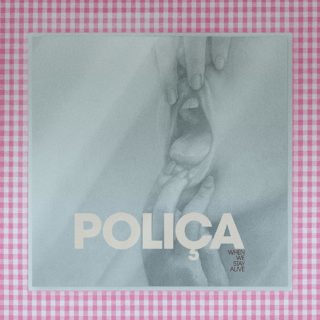Poliça
When We Stay Alive
8/10

8/10
When they released their deeply political last record, United Crushers, in the thick of the 2016 election campaign, Poliça broke with the form book. The two full-lengths that preceded it were largely heartbreak pieces, preoccupied with turning breakups into low-key synthpop bangers in the manner effectively trademarked by The xx. The crucial talking point with United Crushers was how striking that pivot was; the defining feature of the sound they’d cultivated previously was that everything was scored through with a chilly air, that everything was self-contained and a little bit arm’s-length. It was an uneven album, but the bravery involved in stepping outside of such a meticulously designed bubble shouldn’t be underestimated.
This time around, the Minneapolis outfit have been brought crashing back down to earth quite literally, by accident rather than design. Hanging heavy over When We Stay Alive are the serious injuries sustained by singer Channy Leaneagh when she fell from the roof of her house whilst clearing ice in February of 2018; less the incident itself and more the physical and psychological aftermath of it. Leaneagh was left partially immobile for a matter of months and there’s a sense across the album that it brought her back in touch with the simple things – the stuff she took for granted beforehand. Opener ‘Driving’ talks of second chances and of “(imagining) wanting life/ and the want remains.”
That kind of focus sets When We Stay Alive apart from its predecessors in that there’s an inherent universality to it; even United Crushers, to a degree, felt personal in its political approach, whereas this album is scored through with a soft urgency inspired by Leaneagh’s life-altering spell in hospital beds and wheelchairs. It makes it all the more surprising, then, that half of the album’s ten tracks were penned before the accident, and it’s therefore a testament to the power of those that came afterwards that they’ve so dramatically coloured the pre-fall cuts.
It’s not that what happened to Leaneagh minimises what she’d been writing about beforehand; there is still power in her nervousness about being the breadwinner on ‘Steady’, her bitterness at the state of local politics on ‘TATA’, and in the stinging treatise on toxic relationships that is ‘Forget Me Now’. The newer songs put those ones in perspective, but more in the sense that the world keeps turning; none of those things stopped happening just because she’d been hurt.
Where the injury has influenced When We Stay Alive, though, is surely in the way it sounds. In another departure from convention, Poliça have subtly reconfigured their approach to place warmth at the centre of their sound. The aforementioned ‘Steady’ for instance, thoughtfully approximates the woozy sound of the slide guitar, which is not something you’d have anticipated for this group when you were navigating the quietly nightmarish Shulamith. The synths on ‘TATA’, meanwhile, conjure up steel drums, accentuating the superficially breezy air of the piece – scratch the surface, though, and there’s an anxiousness to the tempo that reflects the lyrics. There’s similar understated tension in the throb of the beat on ‘Feel Life’, and in the low-level white noise in the background of ‘Little Threads’, which has Leaneagh at her most vocally mercurial; she’s borderline conversational one minute, and hitting swooping high notes the next.
Still, those flourishes won’t reveal themselves on first listen and, instead, you suspect that the casual takeaway from When We Stay Alive will be the poppy embrace of melody on tracks like closer ‘Sea Without Blue’, or the undulating harmonies that form the backbone of ‘Blood Moon’. Shulamith and, before it, Give You the Ghost were, in retrospect, fairly oppressive listens; claustrophobic and moody.
There’s points at which that particular spirit is summoned on When We Stay Alive – particularly the tumultuous ‘Fold Up’, which feels out of place – but a lot of the time the antithesis of that reigns; sonically, there’s spaces left empty to allow Leaneagh’s thoughts room to breathe (the final ninety seconds or so of ‘Be Again’ is a convincing case in point) and, accordingly, the songs are almost defined as much by the musical ideas that the band chose not to use. It’s an exercise in minimalism.
In an ideal world, Leaneagh would not have broken her back and it would be naive to glamourise, even for a second, the excruciating pain and suffocating anxiety that surely came with it. It does seem to have triggered a creative rebirth, though, one abundantly present in When We Stay Alive’s many nuances. After the soul searching of United Crushers, there’s a tranquility to Poliça here. It suits them.